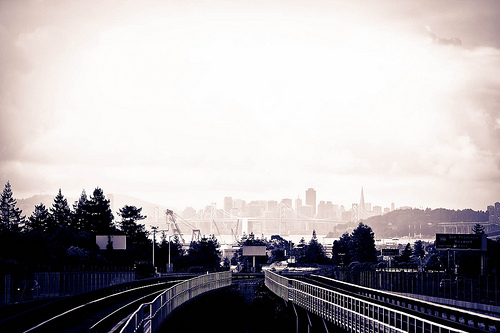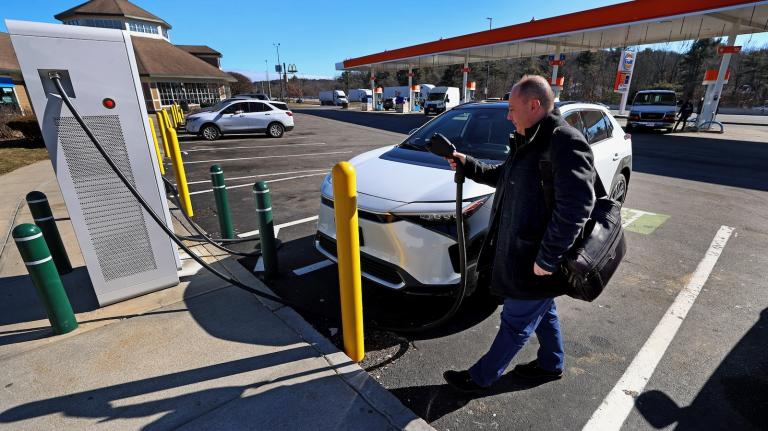 The view from Oakland.Photo: Sharat GanapatiI grew up in Cleveland. Yeah, Cleveland. I know, hailing from a less-than-premiere address leaves me open to a certain amount of disdain from urban elitists. Being from the city that is widely regarded as the “Mistake on the Lake” is urbanism’s equivalent to being the fat kid in gym class, and it can leave one just as scarred as too many dodgeball hits to the face.
The view from Oakland.Photo: Sharat GanapatiI grew up in Cleveland. Yeah, Cleveland. I know, hailing from a less-than-premiere address leaves me open to a certain amount of disdain from urban elitists. Being from the city that is widely regarded as the “Mistake on the Lake” is urbanism’s equivalent to being the fat kid in gym class, and it can leave one just as scarred as too many dodgeball hits to the face.
I don’t live in Cleveland anymore, but I didn’t leave because I wanted to be one of the cool kids. I was stricken with the burning need to explore, to go new places, and stake a claim for myself. And the more I travel, the more I find myself drawn back to my Rust Belt roots — not Cleveland per se, but some semblance of it elsewhere in the world.
When I graduated from Georgetown in 2005, social momentum seemed to offer two choices: Stay in Washington, D.C., or be a rebel and move to San Francisco. I chose San Francisco. It was — it is — architecturally beautiful and politically liberal; the weather was good and the vibe was exciting. It was expensive as hell, too — it would be a real challenge on my meager Americorps living allowance — but I figured that I’d get one of those fancy high-paying careers that all San Franciscans seemed to have, then settle in, build a family, and grow old.
It wasn’t long after I arrived, however, that I began to feel unnecessary. San Francisco is exciting, sure, but it’s because the city — like New York, or L.A., or other urban brands — churns along on its own rhythms, driven by the labors and commitment of the hundreds of thousands of people who have already established themselves. It seemed like every niche was filled, and usually by someone both richer and cooler than me. I moved around for a few years, bouncing between different addresses in the Bay Area, heading down to Southern California for a spell, and even revisiting Cleveland, a fancy high-paying career slipping further and further from reach as the worldwide economy imploded.
And then, in early 2009, I discovered a little patch of Cleveland in California, just across the Bay Bridge from San Francisco: Oakland. Like my hometown, Oakland is ridiculed by those from posher zip codes and written off by most outsiders (and even some insiders). I came to Oakland for a non-fancy, low-paying job that I loved and found my own version of paradise, replete with affordable rents and restaurants without four-hour waits for a seat. It was just the kind of place where an urban-minded, broke-ass, fashion victim like myself could feel at home: Wearing sweatpants to the grocery store was socially acceptable, and I didn’t need an impressive job title or great condo to fit in.
Like Cleveland or any other down-and-out city across the country, Oakland is a fixer-upper kind of town, thirsty for young people, where elbow grease and commitment to place matter more than the state of one’s bank account. Since moving here, I’ve found the purpose I was lacking when I lived across the bay, and I’m gratified that my work has a real impact in the community.
Earlier this year, a friend and I co-founded Femikaze, a feminist sketch comedy troupe. (And if you don’t believe that “feminist” and “comedy” are natural allies, you should come to one of our shows!) We had our first independent production in October, a full-length show here in the East Bay that sold out three of our four nights. We’ve already scheduled three more shows for next year.
It’s the kind of thing that would have been exponentially more difficult in San Francisco, where any given Friday night offers thousands of entertainment options, including dozens of comedy shows. We’re only a few miles away from the frenzy here in Oakland, but it’s quiet enough that we don’t have to shout to get anybody’s attention. There’s room for two determined women, with no patron and no budget, to start something.
Many San Franciscans find my decision to quit the hip side of the bay befuddling. “There’s nothing there,” they say of Oakland. They’re not entirely wrong, either. There really IS less (although far from nothing) in places like Oakland and Cleveland — or Pittsburgh, or St. Louis, or Knoxville, or dozens of other underrated, underpriced, overlooked cities — than can be found in thriving urban centers like San Francisco, New York, or Boston. But that’s just their charm.
“Less” might be boring to some, but to those of us who strive to create and produce and make a difference, “less” also means fewer resources are required to start something new, and less competition comes from established entities. As someone perpetually short on cash but long on idealistic ambition, I’ve found more opportunity in a second-tier city like Oakland than I ever knew in San Francisco. And although some people out there like to use my address as the butt of a joke, I’ve found it to be a rich, fertile place to build a life on my own terms.
To recent or upcoming college graduates, I offer my own bit of meager counter-wisdom: Forget about Washington, D.C., San Francisco, New York, Chicago, and L.A. Look for a city that will value your presence and appreciate your efforts, a city that doesn’t think you’re disposable just because you’re young. It’ll be easier on both your wallet and your soul.
Sure, you might catch some flack for moving to a place where “there’s nothing there,” but take it from me — I came from the Mistake on the Lake, and to my mind, “there’s nothing there” is just another way of saying “there’s nothing in my way.”
An earlier version of this essay appeared in Rust Wire.

